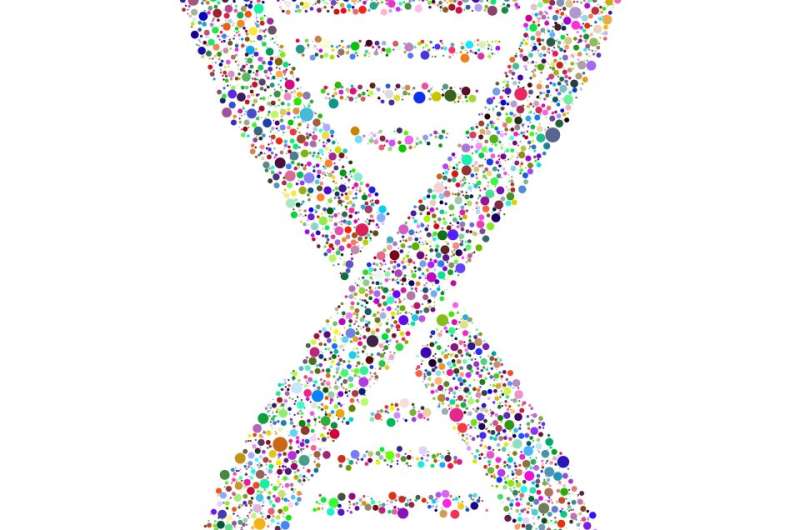This article has been reviewed according to Science X's editorial process and policies. Editors have highlighted the following attributes while ensuring the content's credibility:
fact-checked
peer-reviewed publication
trusted source
proofread
Researchers develop gene editing approaches for phenylketonuria treatment

Phenylketonuria (PKU) is a rare newborn genetic disease that impacts between 1 in 10,000 to 1 in 20,000 people, depending on the individuals' genetic ancestry. PKU causes an amino acid—called phenylalanine (Phe)—to build up in the bloodstream. Uncontrolled PKU can lead to intellectual disability, psychiatric issues, and seizures. While current therapies can partially improve outcomes, they require meticulous, lifelong compliance that is very difficult for most patients.
New research from the Perelman School of Medicine at the University of Pennsylvania provides insights into potential future treatments using gene editing—specifically, two newer forms of CRISPR gene editing, prime editing and base editing.
Two separate studies, one in The American Journal of Human Genetics and the other in Human Genetics and Genomics Advances, were published today. The findings were also presented at the American Society of Human Genetics (ASHG) annual meeting in Washington, D.C., by Dominique Brooks, a graduate student in the laboratory of Kiran Musunuru, MD, Ph.D., a professor of Cardiovascular Medicine and Genetics at Penn.
In the first of two studies, the researchers explored a "prime editing" approach to correct the genetic variant responsible for the condition. Prime editing, often compared to a word processor, allows for precise changes to be made in the DNA by rewriting specific genetic sequences. Using data from 129 individuals with PKU, researchers revealed that those with a specific genetic variant called c.1222C>T in the phenylalanine hydroxylase (PAH) gene—the most common PKU-causing variant worldwide—had very poor control over their metabolic condition.
PKU patients need to maintain Phe levels between 120-360 μmol/L to stay healthy. However, a majority of those studied had Phe levels above that range, which can lead to neurological damage. The team conducted experiments on human liver cells with the problematic gene and successfully proved the effectiveness of this prime-editing method, potentially paving the way for therapeutic interventions.
Additionally, using prime editing in the liver of mice, researchers successfully corrected the genetic PAH c.1222C>T variant. This led to a substantial reduction in Phe levels, with all treated mice falling well below the 360 μmol/L threshold. Importantly, this correction was achieved without affecting the mice's liver function.
"This research brings hope for those with PKU, a lifelong disease with no durable treatments, as it demonstrates the feasibility of using gene editing to permanently correct the most common genetic variant associated with this condition," said Musunuru, a senior author of both studies. "While there are still challenges to overcome, these findings open the door to potential new treatments that could significantly improve the lives of PKU patients."
The second study also focused on the most frequent genetic cause of PKU, the same PAH c.1222C>T variant. Using base editing—a gene-editing technique that precisely modifies a specific DNA sequence by replacing one DNA letter with another DNA letter, reminiscent of a pencil and eraser—they first tested this method in lab-grown liver cells and then in mouse models.
The researchers found that when the selected base editor and guide RNA were delivered into the mice via lipid nanoparticles, using similar technology as the COVID-19 mRNA vaccines, Phe levels were normalized within 48 hours. In related studies, the researchers have observed reductions in Phe levels to be sustained for one year so far. This is a significant breakthrough in the treatment of PKU, which typically requires lifelong management of Phe levels.
"These findings are a significant step forward in the treatment of PKU," said Rebecca C. Ahrens-Nicklas, MD, Ph.D., an assistant professor of Pediatrics at Children's Hospital of Philadelphia and a senior author of both studies. "While our results with animal models point us in the right direction, future research is needed to move these advances forward. For example, next, we will focus on refining the base-editing approach and comparing its effectiveness to other gene-editing methods."
More information: The American Journal of Human Genetics (2023).
Human Genetics and Genomics Advances (2023).



















